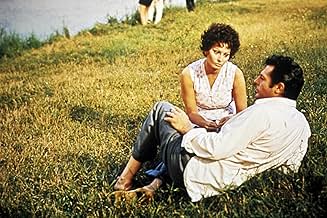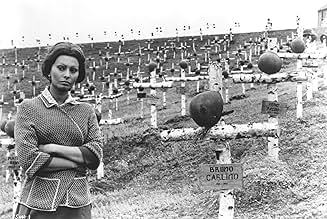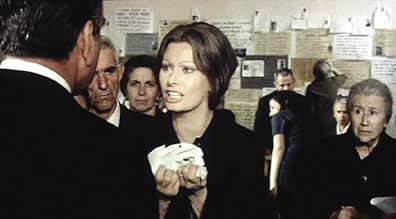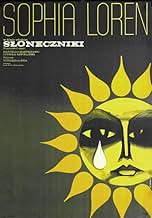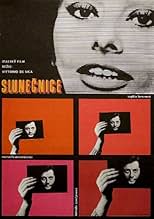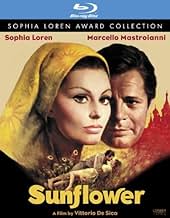NOTE IMDb
7,3/10
4,9 k
MA NOTE
Une femme italienne mène une recherche désespérée pour retrouver son mari, un soldat porté disparu au combat en Russie pendant la Seconde Guerre mondiale.Une femme italienne mène une recherche désespérée pour retrouver son mari, un soldat porté disparu au combat en Russie pendant la Seconde Guerre mondiale.Une femme italienne mène une recherche désespérée pour retrouver son mari, un soldat porté disparu au combat en Russie pendant la Seconde Guerre mondiale.
- Réalisation
- Scénario
- Casting principal
- Nommé pour 1 Oscar
- 1 victoire et 2 nominations au total
Lyudmila Saveleva
- Mascia
- (as Ljudmila Saveljeva)
Nadya Serednichenko
- Contadina russa
- (as Nadja Cerednicenko)
Gunars Cilinskis
- Funzionario russo
- (as Gunnar Zilinskij)
Carlo Ponti Jr.
- Giovanna's Baby
- (non crédité)
Mariya Sapozhnikova
- Passerby
- (non crédité)
Avis à la une
I just finished watching the stunning Blu Ray of the original Italian English-subtitled version of this film--the best version available. I do not understand all the naysayers reviewing this film. If you are a fan of Loren and Mastroianni, if you are a fan of DeSica, if you enjoy a good old-fashioned melodrama that will tear at your heart, you MUST see this film! To dismiss this film as Soviet propaganda, or as unrealistic, is like criticizing "The Little Mermaid" for having a singing mermaid and talking fish. It utterly misses the point. This movie contains one of the very best, if not THE best Sophia Loren performance on film. Henri Mancini's score is unforgettable. This film makes you care about the plight of both characters. It is available as part of the new "Sophia Loren Collection" box set, and for me, this, along with "Marriage Italian Style," is the "jewel" of the set. See it!
You know the plot.
Sunflower was Vittorio De Sica's last film. It was dismissed by the critics as hopelessly maudlin melodrama. But anyone who cares enough to be reading this no doubt knows the humanity he crafted into every frame, and the beauty and sadness of life it evokes.
Henry Mancini's theme song is, IMVHO, the very best he ever wrote. I'm reduced to tears every time I hear it. Yet it seems Mancini himself treated as a lesser child. His daughter recorded it to lyrics better left forgotten.
Sunflower was Vittorio De Sica's last film. It was dismissed by the critics as hopelessly maudlin melodrama. But anyone who cares enough to be reading this no doubt knows the humanity he crafted into every frame, and the beauty and sadness of life it evokes.
Henry Mancini's theme song is, IMVHO, the very best he ever wrote. I'm reduced to tears every time I hear it. Yet it seems Mancini himself treated as a lesser child. His daughter recorded it to lyrics better left forgotten.
Vittorio de Sica achieved a remarkable feat in this eye-catching 1970 production, bringing together Americans and Soviets, in the midst of the Cold War, in the co-production of a Franco-Italian film.
From the Americans he got a memorable soundtrack, written and directed by Henry Mancini and nominated for an Oscar. From the Soviets he received the footage from Mosfilm, directed by Andrey Konchalovskiy, as well as the actress Ludmila Saveleva.
The script by Tonino Guerra and Cesare Zavattini has everything it needs to work, but the film gets lost somewhere in between so many attributes.
The story is basic and excessively melodramatic. The soundtrack is beautiful but quickly becomes cloying. The footage of the sunflower fields and the cemeteries of Russian combatants is powerful and eloquent, but inconsequential. This is, after all, a story of the living, not the dead. Only the final notes of the fatalism of war, which determines people's fates, far beyond their individual will, remain to give the film any meaning.
But it is not enough. A final result clearly less than the sum of its parts.
From the Americans he got a memorable soundtrack, written and directed by Henry Mancini and nominated for an Oscar. From the Soviets he received the footage from Mosfilm, directed by Andrey Konchalovskiy, as well as the actress Ludmila Saveleva.
The script by Tonino Guerra and Cesare Zavattini has everything it needs to work, but the film gets lost somewhere in between so many attributes.
The story is basic and excessively melodramatic. The soundtrack is beautiful but quickly becomes cloying. The footage of the sunflower fields and the cemeteries of Russian combatants is powerful and eloquent, but inconsequential. This is, after all, a story of the living, not the dead. Only the final notes of the fatalism of war, which determines people's fates, far beyond their individual will, remain to give the film any meaning.
But it is not enough. A final result clearly less than the sum of its parts.
meeting between two great actors and an impressive director. images from Italy and picture of Russia in the air of Cold War.a basic story about a couple, a war and a choice. a travel and the form of truth. beautiful music and force of unspoken words. that is all. or only gentle performance of Ludmila Savelieva. a great film. not for cast or dramatic slices, for the force of emotions or for the sunflower as vegetable testimonies about a tragedy. but only for its virtue to be a seed. a seed of questions and answers. an exercise of empathy. a sad love story in which love is more than feeling. a poem but just a very special poem. mixture of pure joy, shadows of war, a miracle and a search, it is homage to a sacrifice generation and reflection of deep need of sense in a chaotic world. nothing pink, nothing cold. only picture of a man, a young Russian woman who speaks Italian, a charming Sophia Loren and same Mastroianni. but the essence is possession of public.
Epic romantic melodrama , set at the end of World War II , dealing with an Italian woman , Giovanna, she is a bereft war bride living near Milan , she conducts a desperate search for her husband, a soldier considered missing in action in Russia during WWII. As her husband never returned after serving on the Russian front . As Giovanna wandering over what feels like the whole of Russia and looking for clues her hubby. A woman born for love. A man born to love her. A timeless moment in a world gone mad. In a world gone mad...a love story. Filmed in Russia from the Kremlin to the Ukraine. A love story that spans two tempestuous decades in a motion picture of extraordinary power and enchantment!
Excruciating drama in which Sophia Loren plays a headstrong Italian wife looking for hubby , going to Russia to find him, starting in the town near the winter battle when he disappeared and much picturesque and soul-searching later she finds him with unexpected consequences . It is a heart-rending and heart-breaking studio of a beloved couple sadly separated by an unfortunate fate . There's a flashback to their brief courtship near her hometown of Naples, his 12-day leave to marry her, and ruses to keep from deploymentby posing as a nutty man . Sofia Loren gives a nice acting as the obstinate woman who refuses to accept that her husband missing on the Russian front, is dead. While Marcello mastroianni is perfect as the amnesic man missing in battle . The Technicolor cinematography by Giuseppe Rotunno and David Vinitsi is truly gorgeous. Shot on location in Russia and infact , this film is deemed to be the first occidental film to be shot in Poltava, Ukraine .And positively soaked in one of Henri Mancini's lushest soudtracks.
The motion picture produced by Carlo Ponti and Joseph H Levine , was stunningly directed by Vittorio de Sica . De Sica told about Loren : ¨I consider Sophia a great , a good actress and a great personality. Because she is a Neopolitan. Like me. We are the same people, the same origin. And we feel together the same. Yes, for me, I am very happy when I work with Sophia¨. De Sica was a famous actor and director .He turned to filmmaking in 1940 , making light comedies. His fifth movie collaborated with writer Cesare Zavattini , I Bambi ni ci guardano ,in which showed great sensitivity and nice fIl making . It was also the first movie he made with writer Zavattini with whom he would subsequently shoot "Shoeshine" , and Bicycle thief .After the boxoffice disaster "Umberto D" , he abandoned the Neorrealist genre to make more commercial films than previous . Subsequently , he he made "Yesterday , Today and Tomorrow" with Marcelo Mastroiani and Sofia Loren in which he won another Oscar . His two final films were Garden of Finzi Contini and A brief vacation that had limited success .Rating 7/10 . Worthwhile watching . Above average . Essential and indispensable seeing for Italian films buffs .
Excruciating drama in which Sophia Loren plays a headstrong Italian wife looking for hubby , going to Russia to find him, starting in the town near the winter battle when he disappeared and much picturesque and soul-searching later she finds him with unexpected consequences . It is a heart-rending and heart-breaking studio of a beloved couple sadly separated by an unfortunate fate . There's a flashback to their brief courtship near her hometown of Naples, his 12-day leave to marry her, and ruses to keep from deploymentby posing as a nutty man . Sofia Loren gives a nice acting as the obstinate woman who refuses to accept that her husband missing on the Russian front, is dead. While Marcello mastroianni is perfect as the amnesic man missing in battle . The Technicolor cinematography by Giuseppe Rotunno and David Vinitsi is truly gorgeous. Shot on location in Russia and infact , this film is deemed to be the first occidental film to be shot in Poltava, Ukraine .And positively soaked in one of Henri Mancini's lushest soudtracks.
The motion picture produced by Carlo Ponti and Joseph H Levine , was stunningly directed by Vittorio de Sica . De Sica told about Loren : ¨I consider Sophia a great , a good actress and a great personality. Because she is a Neopolitan. Like me. We are the same people, the same origin. And we feel together the same. Yes, for me, I am very happy when I work with Sophia¨. De Sica was a famous actor and director .He turned to filmmaking in 1940 , making light comedies. His fifth movie collaborated with writer Cesare Zavattini , I Bambi ni ci guardano ,in which showed great sensitivity and nice fIl making . It was also the first movie he made with writer Zavattini with whom he would subsequently shoot "Shoeshine" , and Bicycle thief .After the boxoffice disaster "Umberto D" , he abandoned the Neorrealist genre to make more commercial films than previous . Subsequently , he he made "Yesterday , Today and Tomorrow" with Marcelo Mastroiani and Sofia Loren in which he won another Oscar . His two final films were Garden of Finzi Contini and A brief vacation that had limited success .Rating 7/10 . Worthwhile watching . Above average . Essential and indispensable seeing for Italian films buffs .
Le saviez-vous
- AnecdotesThe child of Giovanna (Sophia Loren) in this film was actually Loren's from her partnership with producer Carlo Ponti.
- GaffesMascia tells Giovanna that when she found Antonio, he was hurt so badly that he had forgotten everything, including his own name. If that's true, then how did Mascia know his name was Antonio?
- ConnexionsEdited into Marcello, una vita dolce (2006)
Meilleurs choix
Connectez-vous pour évaluer et suivre la liste de favoris afin de recevoir des recommandations personnalisées
- How long is Sunflower?Alimenté par Alexa
Détails
- Durée
- 1h 47min(107 min)
- Mixage
- Rapport de forme
- 1.85 : 1
Contribuer à cette page
Suggérer une modification ou ajouter du contenu manquant


